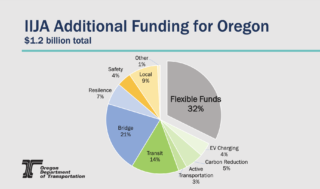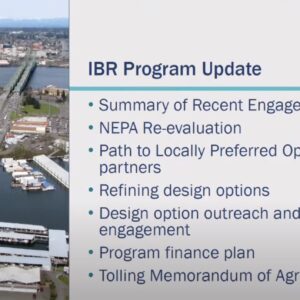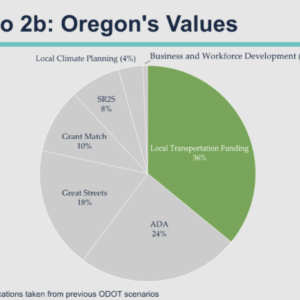“When gas prices are high like this, people start making different modal choices, and they never go back.”
— Julie Brown, OTC member
A press release from ODOT last week about a meeting of the Oregon Transportation Commission raised eyebrows here at BikePortland headquarters. “There was consensus that funding for highway expansion projects should not be the priority of this flexible funding,” it read.
The funding referred to was the $412 million up for grabs thanks to the federal government’s Infrastructure Investment and Jobs Act (IIJA).
Climate change and transportation reform activists have been outspoken about what should be funded and have asked the OTC to back projects that will reduce greenhouse gas emissions and improve active transportation options around the state. At an OTC meeting last week, commissioners recognized this public consensus and indicated a desire to move away from traditional highway funding.
As we wrote about last week, OTC members have shown increasing skepticism for funding freeway projects like the Interstate Bridge Replacement Program and I-5 Rose Quarter expansion.
During the IIJA discussion held later at the same meeting, all five OTC members called for deemphasizing enhancing highways in some capacity. Commissioners Julie Brown and Sharon Smith both showed support for a new plan that would combine the “Fix-It” and “Public and Active Transportation” scenarios, two of four funding proposals put together by ODOT. This allocation would maintain investments in fixing roads and bridges, but give more money to the Great Streets and Safe Routes to School programs (both of which emphasize non-freeway projects for people who walk, bike and take transit).
Advertisement

Commissioner Brown, whose day job is general manager of Rogue Valley Transit District, pointed out what many transportation activists have been saying for weeks now since the start of the war in Ukraine: “We’re going to see a shift of people wanting to use public transit, walking and biking,” she said. Brown elaborated on that by pointing out how people’s transportation choices shifted in 2008, the last time gas prices were exceptionally high.
“We have a responsibility to make sure the infrastructure is there,” Brown said. “When we put investment into public transportation and active transportation, that will move the needle. When gas prices are high like this, people start making different modal choices, and they never go back.”
OTC Chair Bob Van Brocklin also showed support for this new, hybrid spending plan, but expressed a desire to focus on a more robust electric car charging system in the state, as well as providing other incentives encouraging people to buy electric cars. This would be on top of the $52 million from the other pool of IIJA funds ODOT has already designated to go to electric vehicle charging.
While ODOT has in the past recognized the increasing popularity of electric bikes, Van Brocklin didn’t talk about improving charging infrastructure or creating incentives for e-bikes or other kinds of electric mobility devices. He spoke about how he thinks convincing people to move from driving gas cars to electric cars will be the best and fastest way to reduce greenhouse gas emissions resulting from transportation.
“We are trying to both maintain and preserve an existing system and prepare for new things. We have to transition from today to tomorrow, specifically in electric vehicles,” Van Brocklin said. “People who won’t ride a bus are willing to buy an EV.”
Ultimately, the consensus at this meeting was to further research the feasibility of a new funding scenario that combines elements from the “Fix-It” and “Public/active Transportation” scenarios. Commissioners will make their final decisions for this funding at the OTC meeting on March 30. You can submit a comment about IIJA funding and learn more at the OTC website.







Thanks for reading.
BikePortland has served this community with independent community journalism since 2005. We rely on subscriptions from readers like you to survive. Your financial support is vital in keeping this valuable resource alive and well.
Please subscribe today to strengthen and expand our work.
And yet the OTC will vote in favor of whatever ODOT puts in front of them – they always have and they always will…
As for the price of gas (and crude oil), apparently it’s too easy for Americans to forget the oil glut way way back during the height of covid lockdowns decades ago in the summer of 2020 when the price of oil was below $zero, that storage facilities were being paid to store the excess. Assuming we don’t first nuke ourselves, this dumb war too will pass, Russian oil will be sold again, the price of oil will drop more (it’s already gone down $30 from its recent records), and unfortunately people will once again be driving their huge gas guzzling SUVs. People are slow to change habits when they are addicted, and most Americans are addicted to cheap gas and driving motor vehicles everywhere. And the OTC members know this. If they were smart, the Oregon legislature would raise gas taxes right now, but they won’t of course.
I have the utmost respect for this commissioner. Who maybe made a few bad votes. She is an actual transport professional with decades of experience in the Rogue Valley. 4 years ago she told me her biggest concerns was medical transport ($50/trip) and ADA ramps. She was right and activist went to bat for that successfully, still work to do. I’m glad she is leading the way, she actually has the professional experience to make these types of changes and decisions when the time warrants.
IDK what the other attorneys bring to the OTC table except to duck up traffic for eight years. The courts are so ducked up we don’t have enough public defenders, yet these attorney commissioners sit on the OTC like they are playing some sort of Sim city video game. Unbelievable egos.
What if we repealed the state gas tax? By law the money can only go for more freeways, so it’s questionable that it’s good for the environment. The tax is also incredibly regressive, hitting poor people that have to drive the farthest with the cheapest gas guzzlers the hardest. We could replace it with a steeply progressive income tax. The tax could exempt those earning less than a living wage and pay for bike and transit facilities that would encourage less pollution, not more.
Nah. Oregon is already too dependent on income taxes, since we have no sales tax or VAT. Driving a gas-powered car should *always* have some direct costs to the driver. Oregon is already experimenting with a per-mile tax (https://www.myorego.org/) in an effort to make EVs pay, but so far it’s voluntary.
I don’t think we need to be more “dependent” on sales taxes—they’re highly regressive, hitting those with the least ability to pay the hardest. Knowing this, Oregonians have overwhelming voted them down a half dozen times. If the gas tax ever got on the ballot, it would be similarly unpopular.
Oregon is “dependent” on one of the most deeply-regressive and anti-poor tax regimes in the USA. In Oregon a single mother who earns $9,051 in taxable income is in the ~9% tax bracket while some rich dude making $90,510,000 is taxed at ~10%.
This is, of course, utterly incompatible with liberalism (from Smith to Mill) and savagely in opposition to progressive politics or other center-left political affiliations.